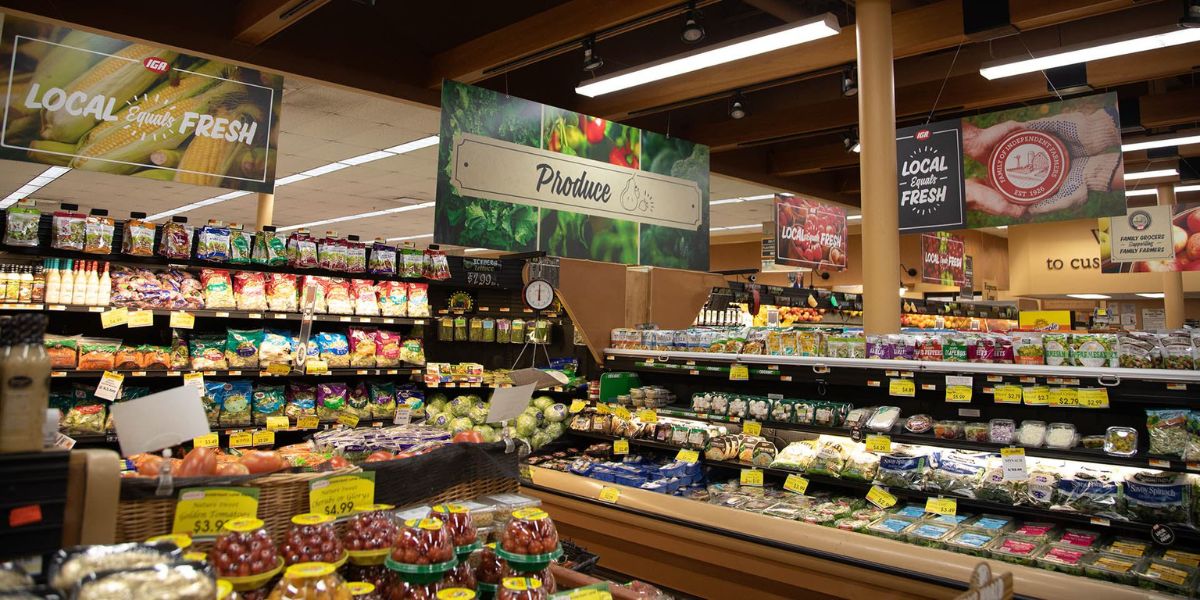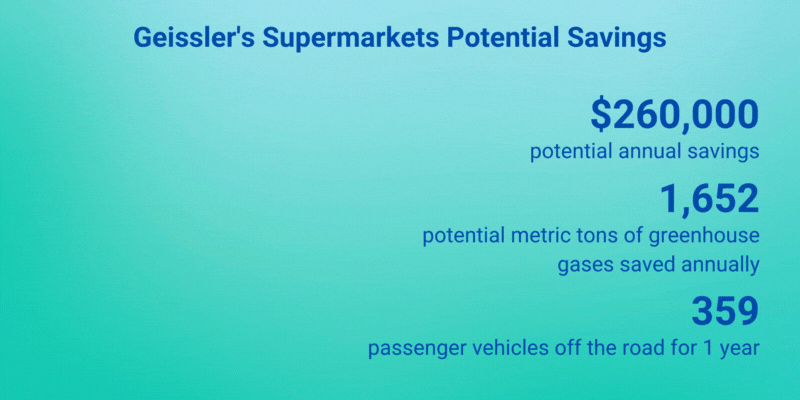Help Isom IGA recover from devasting floods

5 min read
How Saving Energy Boosts Profits & Attracts Workers
Written by Jessica Vician
Oct 19, 2022
With labor challenges and inflation overwhelming grocery operations, sustainability is likely the last thing on an independent retailer's mind. But with 65% of shoppers wanting retailers to invest more in sustainability, and 71% of job seekers wanting to work for an employer who is actively helping the planet — not to mention to the cost savings and increase in profits when implementing easy energy savers — independents cannot ignore the defining issue of our time.
"In any high volume, low margin business, which grocery certainly is, you have to be very disciplined about your cost structure. You look around your business and see costs are going up around us — energy costs, utility costs, labor costs, regulatory issues — what do I have under my control?" IGA CEO John Ross asks.
"One of the places that you can absolutely reduce costs is in the energy signature of your store," Ross reveals. "If you can take that cost out, that's a gift that gives forever."
For example, by switching to LED lighting, Ross says retailers often see savings within a few months, and that's money that they can pass onto shoppers or invest in other ways to better their business.
But back to timing. Why sustainability now, in the middle of inflation and labor challenges and before the busy holidays? As the aforementioned statistics demonstrate, it's always time to attract shoppers, and it's especially time to attract job seekers. The newest group of consumers establishing their grocery shopping routine and preferences, Gen Z, is also the newest group of potential employees. 76% of them say sustainability is one of their biggest societal concerns, according to a Pew Research report. And with nearly 70% of people more willing to apply for and accept positions from companies that prioritize sustainability, retailers can gain an advantage with these shoppers and job seekers by putting their sustainable efforts on display.
Plus, October boasts International Day of Climate Action (Oct. 24) and Sustainability Day (Oct. 26), two days that serve to light a proverbial fire under every human to step up their contributions to bettering the planet we live and work on.
And if those reasons aren't convincing, there are the savings and profits. After all, every $1 saved by implementing energy efficient savings in grocery stores equals $18 in revenue.
“Since energy and waste bills are paid out of gross profits, a store must sell many dollars’ worth of product to produce $1," Peter Cooke, co-founder of Ratio Institute, a nonprofit focused on sustainability for food retail, explains.>
That means that by implementing small practices that can save your store $15,000 a year, the potential revenue benefits could be $270,000.
"There are real foundational opportunities for profit improvement and taking credit for the great things [retailers] are doing in their communities today and how taking credit for those things can help their business." Jonathan Tan, co-founder at Ratio Institute, says.
Retailer Story: Geissler's Supermarkets
Geissler's Supermarkets, a group of seven independent grocery stores in Connecticut and Massachusetts, completed the IGA Coca-Cola Institute's Sustainability Certification earlier this year to determine where the stores could save money. Stores can choose a virtual or in-store assessment, and Geissler's President and CEO Bob Rybick opted for the in-store assessment, which brought Cooke to each of the seven stores for 45-minute visits.
After the visits, Cooke and the Ratio Institute team put together resources for Rybick and the Geissler's team, including specific opportunities to reduce cost and increase margins by making changes in refrigeration, HVAC, water, lighting, and more.
Cooke found that the Geissler's stores were already doing a good job with their efficiency measures, as they had recently installed LED lighting and retrofitted doors on dairy cases. In fact, those efforts were saving them $624,842 per year in reduced costs, which is an average savings of $89,263 per store.
"They were already saving 4,072 metric tons of greenhouse gases per year," Cooke reports, "but with additional measures, they could save 1,652 metric tons more each year. That's the same as 359 passenger vehicles being driven for a year!"
Those additional measures included specific suggestions in refrigeration, water, HVAC, and more lighting improvements. For example, by fixing their leaky walk-in freezers, they could save nearly $10,000 a year and almost 90,000 kWh a year. Adding motion sensors to case lighting could result in nearly $55,000 in savings each year.
All told, the seven Geissler's stores could see nearly $260,000 in annual savings after implementing Ratio Institute's recommendations. Without those efficiency measures, the stores would need to sell $4.68 million in products to see that return.

The process had a profound effect on Rybick. "Moving forward we are much more conscious of maintenance issues and have worked towards regular inspections and addressing the issues quickly, even if we need to outsource those repairs, because we now see the tremendous value in energy savings," he says. "It also creates a better working environment for our staff when they are not contending with leaky freezer doors that can cause dangerous icy conditions."
As Geissler's wraps up a remodel at their Agawam, Massachusetts store, they have the opportunity to make more energy efficient upgrades. For example, their new produce case has NRG coils, which Rybick says save substantial energy versus traditional coils. They are also considering solar energy.
"With the new 30% tax credit incentive up from 26%, solar now makes even more sense to evaluate," Rybick says. "If you own your building or have a long-term lease, you can reduce a substantial amount. Our preliminary evaluation shows we could utilize our whole place to offset over 30% of our energy consumption, which in an increased energy cost environment only benefits you more over time. Taking advantage of accelerated depreciation and the increased tax credit allow you to get great paybacks, sometimes as quickly as four years on a system that can last 20 years or more."
Take The Instant Savings
"Pay attention here because there's instant savings; it's low hanging fruit," Ross says about the suggestions offered by the Ratio Institute team through the Sustainability Program.
With savings and potential profit on the line, there's no time to waste. Start with a self-assessment of your store. Use the IGA Coca-Cola Institute's Sustainability Self-Assessment to walk through the store and answer questions.
"Anyone in the store can complete the assessment questionnaire; there is no previous experience required," says Ana Velázquez, learning solutions director at IGA Coca-Cola Institute.
Then, the Institute will analyze the store's results and provide a sustainability rating, along with suggestions on where to improve, which will help the store prepare the next step: Sustainable Food Retail Certification by Ratio Institute, which will provide an in-depth analysis of your store's current efforts and opportunities to improve. This the certification that Geissler's completed.
Want to go even further? Velázquez recommends taking all of the courses in the IGA Coca-Cola Institute's sustainability line-up, co-developed by Ratio Institute:
- Sustainability - Ratio - Top 5 Grocery Store Energy Savers - 18m (E-0E8JR1)
- Sustainability - Ratio - Top 10 Waste Reduction Practices - 18m (E-0YQ4RV)
- Seafood - Sustainable Practices - 10m (E-VNE9QV)
Join The High Comp Stores
"We're talking about figuring out ways to take cost out of your store or to improve the competitive advantage of your store relative to other stores in your marketplace by having a plan on reducing your energy signature and becoming more environmentally friendly as a store," Ross says about the practices assessed and recommended in the Sustainability Program.
He says stores with the highest comps have something in common: they reinvest in their business, especially in sustainable improvements.
"You get two results for the same investment: your business improves through these reinvestments and you help improve the planet."
Once stores have their certification rating, they can promote it on social media, their websites, and in their ads, which in turn will attract shoppers and job seekers.
"It's a win-win-win," Ross says.
You May Also Like
These Stories on Sustainability
Apr 26, 2023 12:47:58 PM |
1 min read
Apr 5, 2023 12:07:43 PM |
1 min read
Nov 15, 2022 9:26:24 AM |
1 min read



No Comments Yet
Let us know what you think